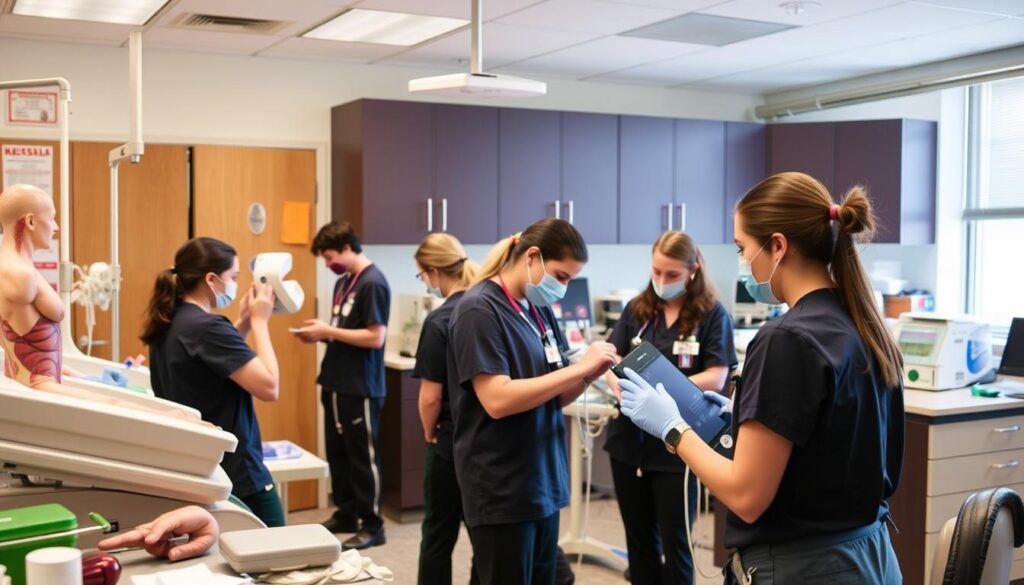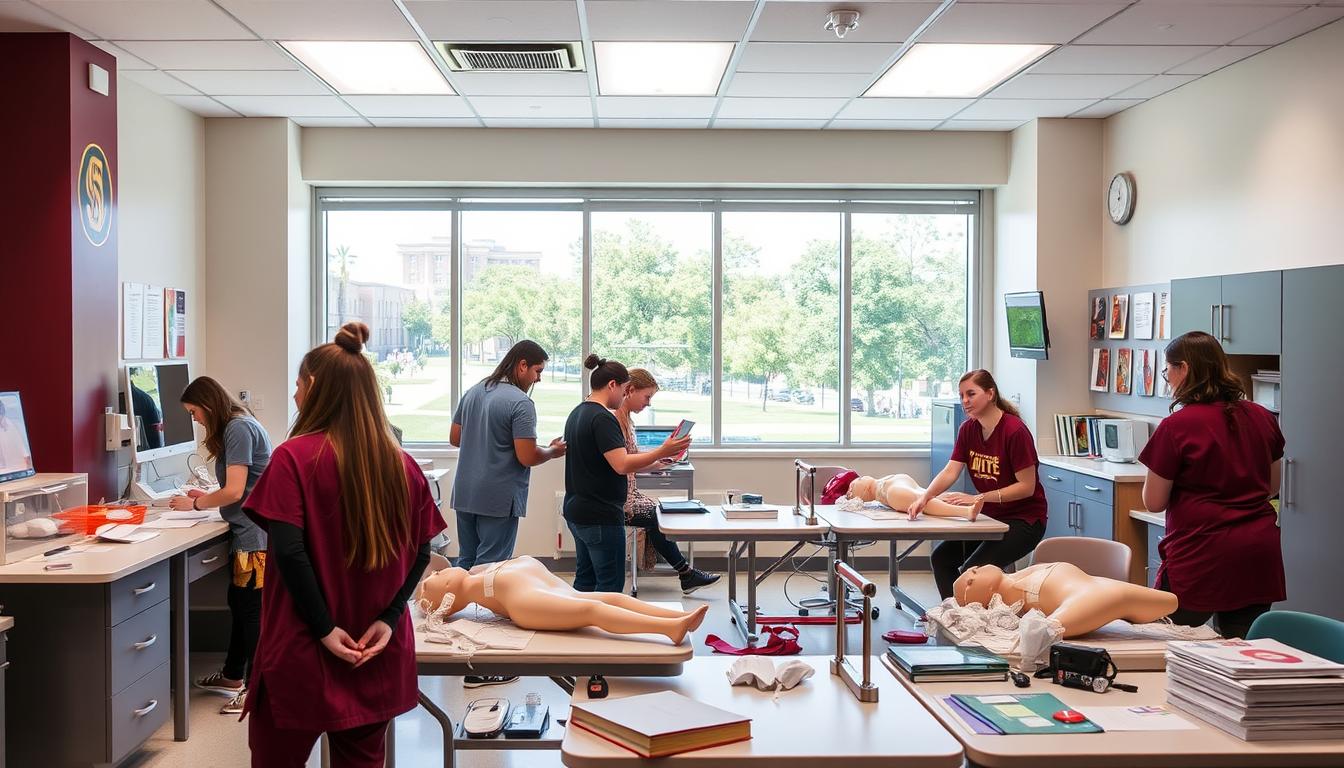Florida State University (FSU) has many nursing programs that prepare students for healthcare careers. The Florida State nursing school is known for its innovative teaching and caring faculty. It offers programs like the Bachelor of Science in Nursing (BSN) and a Master of Science in Nursing (MSN) with different specializations.
The BSN program takes about 15-16 months to complete. It has four semesters filled with clinical experiences in places like hospitals and clinics1. The MSN program has special tracks like AI Applications in Health Care and Nursing Education. This shows FSU’s focus on meeting today’s healthcare needs2.
FSU is a top choice in Florida for nursing education. It makes sure graduates are ready for today’s nursing challenges.
Key Takeaways
- FSU’s nursing programs are accredited and well-respected in Florida.
- The BSN program offers valuable clinical experiences in various healthcare settings.
- FSU provides a holistic admissions process to assess applicants effectively.
- The MSN program features advanced concentrations to align with current industry demands.
- Financial resources, including scholarships and loans, are available for nursing students.
- Student support services like counseling and tutoring enhance academic success.
Overview of Florida State University College of Nursing
The Florida State University College of Nursing aims to create top-notch nurses. It offers tough academic programs and hands-on clinical experiences. Since 1973, it’s known for its outstanding nursing education, ranking among the best in Florida.
Today, it has about 553 students in various nursing programs. Every fall, around 120 students start their BSN journey3.
Graduates pass the state nursing exam with a 97.8% success rate. This shows the college’s high standards. Freshmen need a 3.5 GPA or higher, and upperclassmen average a 3.78 GPA3.
The college focuses on learning and teamwork in healthcare. It prepares students for quality care in different places.
The college is nationally recognized for its quality. It’s been accredited by the National League for Nursing since 19523. It also offers a BSN-MSN program for advanced practice, requiring 39 credit hours and 500 clinical hours4.
Looking ahead, the college is dedicated to leading in nursing education.
Accreditation of FSU Nursing Programs
Florida State University offers top-notch nursing programs. These programs meet strict standards, ensuring students get a quality education. The Commission on Collegiate Nursing Education (CCNE) fully accredits these programs. This means they are ready for students to pass the NCLEX-RN exam5.
Getting accredited is a big deal. It shows that FSU is serious about teaching nursing well. Students learn important nursing skills and sciences. This helps them build a strong base for their nursing careers5.
Being part of an accredited program has many benefits. Students who graduate often find better jobs and move up in their careers. This is because employers know they’ve been well-trained5. Nursing students leave FSU ready to make a difference in healthcare.
Florida State University Nursing Programs: Bachelor of Science in Nursing (BSN)
The Bachelor of Science in Nursing (BSN) program at Florida State University is a strong choice for future nurses. It combines liberal arts, sciences, and nursing skills. This program is approved by the Florida Board of Nursing and accredited by the Commission on Collegiate Nursing Education. It’s a key part of the top nursing programs at FSU5.
Program Structure and Duration
The BSN program lasts about 15-16 months, spread over four semesters. Students start in their junior year, after finishing required courses. They must also pass a Digital Literacy Requirement with a “C” or higher in certain courses5.
During this time, students take nursing courses like NUR 1010r, NUR 1920r, and NUR 3026L. These courses focus on essential nursing skills.
Clinical Experience Opportunities
The Florida State nursing school emphasizes clinical practice. The BSN program gives students lots of hands-on experience in hospitals, health agencies, and clinics. This prepares them well for the NCLEX-RN exam and various nursing specialties5.

For Florida students, the BSN program costs about $5,391, including tuition and lab fees. Non-residents pay around $11,538. Extra costs for things like MedAffinityEHR, background checks, and CPR certifications may also apply6.
Admission Requirements for FSU Nursing Programs
Applying to Florida State University’s nursing school has specific rules. These rules make sure students are ready for the program’s challenges. The admissions look at grades, activities, and personal stories.
Holistic Admissions Process
FSU uses a detailed way to check applicants. They look at more than just grades. They want to see what makes each student special.
Prerequisite Courses and GPA Standards
To get into fsu nursing programs, you need to pass certain classes. You also need a 3.0 GPA, with no less than a C in each class7. Getting in is tough because there are only so many spots7.
Students start with 60-61 credits in their first two years7. Also, you can only transfer to the Tallahassee campus in person7.
In short, FSU’s nursing school is tough but supportive. It’s not just about grades. They want to see your whole story. Being smart and unique is key to succeed in nursing8.
Masters of Science in Nursing (MSN) at FSU
The Masters of Science in Nursing (MSN) program at Florida State University is designed to meet the changing needs of healthcare. It focuses on innovation, with special areas like AI Applications in Health Care and Nursing Education. This makes FSU a top choice for nursing programs in Florida.
This program is a leader in the U.S. because it uses artificial intelligence in nursing practice and education. It’s a groundbreaking effort9.
Program Concentrations: AI Applications in Health Care and Nursing Education
The MSN program’s special areas let nurses explore how modern technology impacts healthcare. The Nursing and Artificial Intelligence Consortium at FSU is a big step forward. It brings together top experts like Rebecca Love and Dr. Lisa Hightow-Weidman.
This group works on creating AI solutions to improve nursing and patient care in real life9.
Curriculum Insights and Faculty Expertise
The curriculum is made to prepare nurses for leading in the digital healthcare world. The faculty at FSU are experts in AI and healthcare, giving students a solid education. The Nursing and AI Innovation Consortium helps students succeed in healthcare technology leadership9.
Unique Features of FSU Nursing Programs
Florida State University’s nursing programs focus on innovation and community. They are leaders in nursing education. The College of Nursing does research that uses technology in healthcare, like the Nursing and Artificial Intelligence Innovation Consortium.
This group works with faculty, students, and local health groups. It aims to improve nursing skills.
Students get a lot of practical experience. The BSN program lasts about 15-16 months. It starts every Fall, Spring, and Summer, with 150 students each time1.
This small group size means students get a lot of attention. It’s great for those starting their nursing careers.

The BSN program looks at community work and work experience too1. This helps pick students who are both smart and caring. FSU helps students become nurses who care about their communities.
The MSN degree also prepares students for leadership roles. It shows FSU’s dedication to making nurses who can lead and teach2.
These nursing programs offer online and asynchronous courses. They are flexible for those with busy lives.
The College of Nursing is recognized by important groups. This makes FSU’s nursing program very respected5.
Florida State University Nursing Programs: Key Faculty and Research Initiatives
The College of Nursing at Florida State University is known for its top-notch faculty and leading research. The faculty focuses on improving maternal health, which helps students learn from the best in the field. They work with healthcare professionals and researchers to advance nursing.
Innovative Research in Maternal Health
Dr. Henna Budhwani leads research on improving maternal health care. She is the first to hold The Michael and Paula Read Phelan Professorship in Obstetrical Nursing. Her work helps students learn the latest in nursing through the Florida State University nursing programs.
FSU is also at the forefront of digital health innovations. Events like the Collaborative Collision: Digital Health bring together experts from healthcare and technology. This collaboration leads to new projects and partnerships10.
These events have sparked new initiatives to improve health in North Florida. They have led to new partnerships, publications, and research grants10. Important topics like personalized medicine and chronic disease management were discussed. This research benefits everyone involved, making the nursing program even stronger10.
Support and Resources for Nursing Students
Florida State University (FSU) makes sure nursing students get the help they need. They offer many resources to help with school and personal life. These services are key for students to handle nursing school’s challenges.
Counseling, Tutoring, and Financial Aid
FSU knows how important mental health and getting help with school is. They have counseling to help with personal and school issues. Also, there are tutoring services to help students do well in their classes.
| Type of Support | Description |
|---|---|
| Counseling | Professional counseling services assist students with personal and academic concerns. |
| Tutoring | Free tutoring sessions are open for various nursing subjects, promoting academic success. |
| Financial Aid | Details about scholarships and aid such as Bright Futures and assistantships are available for eligible students. |
For support for nursing students fsu, money matters a lot. Students can get financial help in the summer by filling out a FAFSA and taking at least 6 credits. Aid is split for part-time students11. All scholarship hopefuls should fill out the FAFSA, and more info is on FS4U11. The Bright Futures scholarship helps for up to 120 credits, which is the BSN program length. It can be extended in some cases11. Ph.D. and DNP students can find assistantship chances, with contacts listed11.
FSU has a strong support system for nursing students. This helps them do well in school and personally. It creates a great place for them to grow.
Student Life at Florida State University
Student life at Florida State University (FSU) is lively and engaging. Nursing students find many activities outside of class. They join clubs and organizations to network and grow professionally. These activities help students bond and make their college experience richer.
Extracurricular Activities and Networking Opportunities
FSU gives nursing students many chances to connect and grow. They take part in health fairs, guest lectures, and community service. These experiences prepare them for healthcare careers and help them make important connections.
- Joining the Student Nurses Association helps students develop leadership skills.
- Health fairs and workshops give students real-world experience.
- Meeting alumni at events can help with job hunting after graduation.
FSU’s nursing programs blend education with student life. This approach helps students grow both personally and professionally. FSU is known for its strong first-year programs and high student satisfaction. It’s ranked No. 7 in the First-Year Experiences category and keeps a 96% freshman retention rate1213.
| Activity | Description | Benefits |
|---|---|---|
| Student Nurses Association | A club dedicated to supporting nursing students through advocacy and professional development. | Enhanced leadership skills and networking opportunities. |
| Health Fairs | Events where students provide health screenings and information to the community. | Real-world experience and community service. |
| Guest Lectures | Invited speakers from various healthcare fields share insights and experiences. | Invaluable knowledge and networking with industry professionals. |
FSU’s efforts to boost student engagement shape the university’s educational landscape. These programs prepare nursing students for their future careers in healthcare, not just academically but holistically12.
Job Placement and Career Support for Nursing Graduates
Florida State University’s College of Nursing focuses on helping graduates find jobs. It has strong ties with local healthcare providers, boosting job chances for students. The college boasts a 99.3% job placement rate for B.S.N. graduates, showing its commitment to support14.
Career services provide many resources, like resume workshops and interview prep. This ensures students are ready to face the competitive nursing job market.
To tackle the healthcare workforce shortage, Florida State is proactive. It aims to prepare graduates for the future needs of healthcare15. The college partners with HCA Florida Healthcare, investing over $4 million in career education15.
Their Nurse Residency program is a highlight. It helps new nurses apply classroom learning to real-world situations15.
FSU’s nursing program focuses on growth and teamwork. It prepares graduates for the field’s challenges. The Clinical Certification Support Program adds to their skills, making them more qualified15.
This mix of education and support leads to high satisfaction among graduates. A 95% satisfaction rate among B.S.N. graduates shows FSU’s programs meet student needs well14.
| Feature | Details |
|---|---|
| Job Placement Rate | 99.3% for B.S.N. graduates14 |
| Graduate Satisfaction Rate | 95% satisfaction among B.S.N. graduates14 |
| Healthcare Workforce Need | Estimated shortage of 463,000 workers by end of 202415 |
| HCA Florida Investment | Over $4 million in healthcare career education support15 |
| Nurse Residency Program | Structured support for first-year nurses transitioning to practice15 |
Cost and Financial Aid for Nursing Programs at FSU
Understanding the financial aspects of nursing programs at Florida State University (FSU) is key for future students. The cost varies based on residency and course needs. Students will face different tuition fees, costs for materials and supplies, and extra expenses for clinical experiences.
Tuition Breakdown and Estimated Expenses
In-State undergrads at FSU’s Tallahassee campus pay between $25,398 and $30,934 annually. Out-of-State students pay more, from $39,831 to $43,58716. Nursing program costs include fees for materials and supplies, similar to other programs like Education and Biological Science17.
Nursing students pay $218 per credit hour if they’re In-State, and $724 if they’re Out-of-State18. They also need to budget for books, uniforms, and clinical experience costs. These can add a lot to the total cost.
FSU helps nursing students financially with various aid options. Students can apply for scholarships, grants, and loans designed for nursing students. These resources help reduce the financial stress of nursing programs at FSU, ensuring students can afford their education and training.
| Residency Status | Off-Campus Living | On-Campus Living | Tuition per Credit Hour |
|---|---|---|---|
| In-State | $25,398 | $30,934 | $218 |
| Out-of-State | $39,831 | $43,587 | $724 |
It’s important for nursing students to know about financial aid. This helps them focus on their studies without worrying about money171618.
Comparing FSU Nursing Programs with Other Top Nursing Programs in Florida
Florida State University (FSU) is a top choice for nursing programs in Florida. It offers accredited programs with high NCLEX pass rates. FSU’s College of Nursing focuses on advanced clinical skills and technology, preparing students for healthcare careers.
The University of Miami has a high NCLEX pass rate of 98.51% but charges $55,440 per year. The University of Florida offers a good balance with a pass rate of 92.33% and lower tuition. These schools are great options for nursing students.
The University of Central Florida is in the top 10% of nursing programs nationally. It offers programs for $10,000 to $12,000. FSU provides hands-on training, similar to Jacksonville University’s 18-month NP program.
The University of South Florida has a pass rate of 94.04% and lower in-state tuition. These factors make it a strong alternative. When choosing a nursing program, consider diversity, cultural competence, and specialized practices.
Prospective students should look at faculty qualifications, graduate outcomes, and program strengths. This helps make an informed decision for their nursing education.
